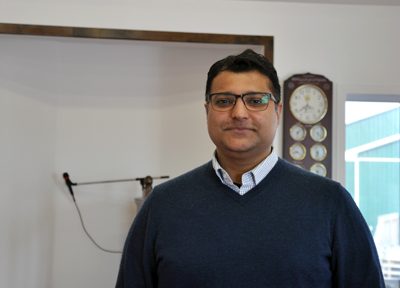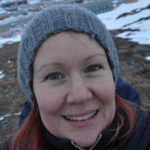Iqaluit Muslims celebrate the holy month
“We get a lot of respect from this community”
Muslims in Iqaluit pause for evening prayer last week in the mosque’s prayer room. (Photo courtesy of A. Jilani)

Atif Jilani is one of the founding board members of the Islamic Society of Nunavut and served as project manager on the mosque’s construction. (Photo by Sarah Rogers)
With the arrival of warm weather in Iqaluit, the windows of Iqaluit Masjid are open and the sound of an evening call to prayer wafts out into the neighbourhood.
Muslims across the globe began fasting on May 5, which marked the start of Ramadan, Islam’s holy month.
Through the month’s daylight hours, Muslims abstain from eating and drinking, a practice in self-control and sacrifice meant to lead to deeper spirituality.
As the sun sets, Muslims break fast together, starting with dates and water or milk, an evening prayer and then a full meal, called iftar.
It’s a time of social gathering too; Iqaluit’s Muslim community has been gathering at dusk to pray and break fast together at the community’s mosque.
It usually takes Atif Jilani a few days for his body to adjust to daytime fasting, but the Iqaluit project manager said he’s settled into the new routine and feeling well.
“We are blessed to have so many luxuries in our lives—this is a great opportunity to get closer to our faith,” said Jilani, a board member with the Islamic Society of Nunavut.
“The best thing here in Iqaluit is the weather is cooperative,” he said. “It’s not too hot—great weather for fasting.”
Because the days are so long across the Arctic at this time of year, the Iqaluit mosque follows the daylight hours of the nearest major city—Ottawa—which means local Muslims are breaking fast around 8:30 p.m.
Jilani is one of the founding members of Iqaluit Masjid and served as the project manager on the construction of the centre in 2015.
In the three years since the mosque first opened in 2016, Jilani now estimates Iqaluit’s Muslim community has a population of about 80.
“It’s small, but we like to think we make a big difference,” Jilani said.
“It’s a huge benefit and a huge blessing. Without a mosque, the Muslim community would definitely have a challenge finding a central place to gather.”
Before the mosque was built, Muslims in Iqaluit gathered in people’s homes or rented space in community centres around the city.
But now the community has its own home, with separate prayer rooms for men and women, rooms for visiting imams, a kitchen and a large gathering space, which also serves as home to the mosque’s bi-weekly food bank.
The food bank is one way the Muslim community gives back to Iqaluit—a community that Jilani said has always made its members feel welcome.
One example of that: standing in one of the mosque’s hallways is a giant white board with messages of support written from residents to the Muslim community following the deadly mosque shootings in Christchurch, New Zealand, last March, when a gunman killed 50 people.
“We stand with you,” the board reads.
“This is great encouragement,” Jilani said. “We get a lot of respect from this community. They are our brothers and sisters.”
If you see a Muslim community member this month, you can wish them Ramadan Mubarak, wishes for a “blessed celebration.”
The last day of Ramadan is June 4, when Muslims celebrate Eid al-Fitr with the breaking of the month’s final fast.







I wonder why there are no women in this picture? Are they allowed into the Mosque at the same time as the men? I know there is some controversy over what the hadith says on this matter and that it is treated differently in different parts of the world. For example, in Saudi Arabia, Abdul-Rahman al-Barrak, has issued a fatwa against those who allow the mixing of the sexes in the mosque and it is punishable by death.
“Whoever allows this mixing … allows forbidden things, and whoever allows them is an infidel and this means defection from Islam … Either he retracts or he must be killed … because he disavows and does not observe the Sharia,” Barrak said.
I doubt it is this extreme here, but I would still be interested to see how it is handled in Iqaluit.
You have no idea what Islam is, you just read what the media lies about or tells part of the story. What your describing is an more conservative Islam which is not what most Muslims are. If you really have concerns come to the mosque, I am an Inuk and had to opportunity during university to sit and learn about Islam with Muslim students and later on during my work I attended Friday prayers with my brothers. I am not saying Islam is perfect but how they view life is a lot more respectful of life, women and the world. I am not going into details but really come learn and listen as media only focus on controversial and negative side of any story! I can say Christians are child molestors from reading from the news!
Oh Ima, I have noticed a patttern in your comments over time; they are often emotional, reactive, poorly thought out. On that note, if you read my comment again you might see that I have taken note that there are variations in Islam around the world. I’ve been several Muslim countries and have visited several Mosques myself. As a westerner I was not always allowed inside, but in some cases I was. Your experience with Islam, as with mine, falls to one range on a very broad spectrum of beliefs and attitudes. I doubt very much it represents the entirety of Islamic thought. In fact if you read the quote above you will know that it doesn’t. Don’t make the mistake of thinking you are en expert on a topic area just for one glancing experience in your life. Think about southerners who spend 6 months in Nunavut and think they are expert on all things Nunavut and Inuit. Annoying right! As for Islamic attitudes toward women, I would encourage you to read ‘The Caged Virgin’ by Ayaan Hirsi Ali for a more global perspective.
The article does say that there are gender-specific prayer rooms:
“But now the community has its own home, with separate prayer rooms for men and women, rooms for visiting imams, a kitchen and a large gathering space, which also serves as home to the mosque’s bi-weekly food bank.”
as a nunavut local i can say fortnite is life
To all of our Muslim friends in Nunavut – Ramadan Mubarak
To our Muslim brothers and sisters; thank you so much for stepping up and running your Food Bank.
I have been there and saw a lot of needy people going there.
Thank you for your generosity and caring for the poor of Iqaluit.